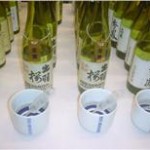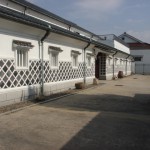 While visiting an old, very prestigious brewer, I was looking at their lineup. There was no junmai amongst their ginjo offerings. While they had their share of junmai-shu itself, once you got into their ginjo world, there was only non-junmai ginjo products.
While visiting an old, very prestigious brewer, I was looking at their lineup. There was no junmai amongst their ginjo offerings. While they had their share of junmai-shu itself, once you got into their ginjo world, there was only non-junmai ginjo products.
I inquired as to why this might be, since it was clearly not just a coincidence. I actually sorta knew, but wanted to hear it from the horse’s mouth, so to speak. And since no reason was being openly offered, I dared to ask.
I promptly got torn a new… well, let’s just say I was instructed as to the nature of my misperceptions.
By the way, Ginjo, in this usage refers to all types of ginjo, i.e. including daiginjo manifestations (basically, ginjo to dai for, so to speak!). And non-junmai here refers to types of sake to which a li’l bit of pure ethyl alcohol (most often distilled from sugar cane) has been added after fermentation, not for economical reasons, but for sound technical reasons. These include, but are not limited to, drawing out more flavors and aromas, and improved shelf life.
Back to their retooling of my perceptions, I was told: “There is no such thing as junmai-ginjo. Not here anyway. Never has been. And those that make it do not really understand what ginjo is all about. Nor do we care what the Ministry of Taxation says on the issue; their priorities are different than ours.” They expounded a bit, but the point was well taken.
And that point is that super premium sake like ginjo and its to-die-for manifestation daiginjo were developed with the addition of alcohol as an integrated and necessary step. The whole “junmai” version came later, and this particular brewer’s point is that the whole hullabaloo about junmai being more pure came later, and is actually not so traditional, as far as the brewing industry itself is concerned. And who’s to argue with them?
Certainly not I.
~~~~~~~~~~~~~~~~~~~~~~~~~~~~~~~~~~~~~~~~~~~~~~~~~~~~~~~~~~~~~
The 2013 Sake Professional Course in New York will be held May 8 ~ 10, 2013. Learn more and make a reservation here: http://www.sake-world.com/html/spcny.html
~~~~~~~~~~~~~~~~~~~~~~~~~~~~~~~~~~~~~~~~~~~~~~~~~~~~~~~~~~~~~~
I am definitely not anti junmai at all. Far from it; very far from it. Nor do I question the
validity of junmai ginjo and junmai daiginjo. I’m just sayin’…you know. I’m just sayin’ that non-junmai types – those made with a bit of pure, distilled alcohol added during the process – are not only valid, not only worthy of our support, but as far as ginjo is concerned, one could say that they are even more traditional. Or at least hold some brewers.
I dunno… I guess it seems to me that, in the sake brewing process, yeast makes alcohol. And some brewers, for some sake, will then add alcohol. It does not fortify the product, as just a little bit is added, and more water is added later to bring the alcohol content back down to “normal” levels. And what is added is pure ethyl alcohol. It’s the same stuff that is already in there. They just add a bit to temporarily (remember that!) raise the overall alcohol content for technical reasons. Just because it was made outside of the process and brought in does not make it unsavory. And no matter what some folks insist, no one can really tell the difference, at least not in premium sake (remember that too!).
So, I am, if anything, anti-anti-junmai, and double negatives notwithstanding, that almost means pro-added-alcohol.
Why? Because very often it makes the sake better – better flavor, better aromas, better shelf life, and very often, a better value. What’s to diss?
All I am saying is give non-junmai a chance; especially in the realm of ginjo.
~~~~~~~~~~~~~~~~~~~~~~~~~~~~~~~~~~~~~~~~~~~~~~~~~~~~~~~~~~~~~
The 2013 Sake Professional Course in New York will be held May 8 ~ 10, 2013. Learn more and make a reservation here: http://www.sake-world.com/html/spcny.html
~~~~~~~~~~~~~~~~~~~~~~~~~~~~~~~~~~~~~~~~~~~~~~~~~~~~~~~~~~~~~~





